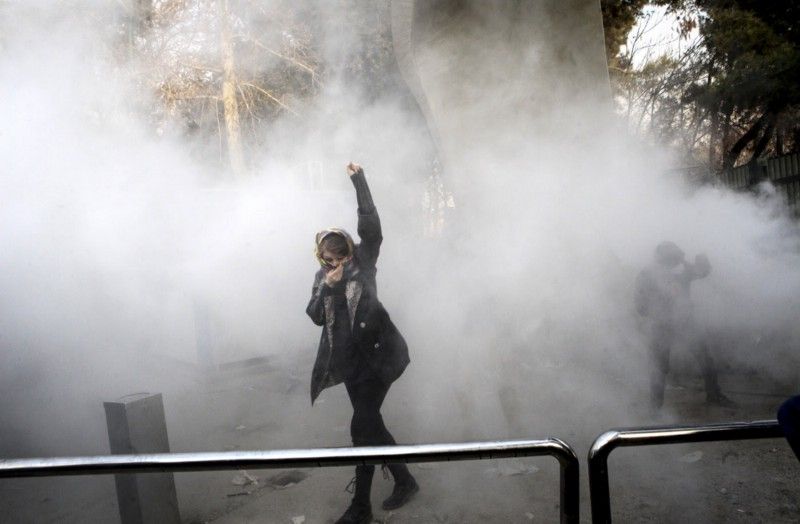While you were celebrating the holidays, we kept track of the last few stories from 2017 that will cast a shadow into this year.
News from one big country that’s not celebrating the New Year (yet)
Well it’s not New Year’s in Iran — Nowruz isn’t for another three months — but thousands of Iranians are on the streets in a dozen cities. These are the largest protests the country has seen since 2009. Social media have been blocked and as of this writing, more than 20 are dead. Here are a few key questions answered:
First, what are they protesting about? The initial demonstrations have focused on economic issues and corruption — unemployment is above 12%, youth unemployment is more than twice that, and food prices recently soared. Most of the economic gains from the opening that resulted from the Iran nuclear deal have gone to the oil sector, leaving ordinary Iranians no better off. As the protests have grown, some participants are taking direct aim at the political system, the clerical establishment, and Iran’s foreign policy.
Second, how do they compare to past protests? In 2009, more than a million people turned out, mainly in the capital, Tehran, to demand a recount after a fraudulent election. Those protests were led by prominent reformist figures within the governing establishment. The current protests, by contrast, are much smaller, more decentralized, and lacking in clear demands — but they are also more spontaneous and widespread throughout the country. One amazing statistic: in 2009 there were 1 million smartphones in Iran — today there are more than 48 million.
Third, who benefits? It remains to be seen whether these protests will helpthe cause of moderates like President Hassan Rouhani, who want to reform the economy further, or hardliners who are skeptical of the Iran deal and keen to point out its economic shortcomings.
Or, a more interesting possibility altogether: could these decentralized, leaderless protests spin beyond the “reformist vs hardliner” parameters of the Iranian political spectrum altogether, and pose a new kind of challenge to the clerics who have run the country for almost four decades?
Kim Jong-un: the olive branch and the nuclear button
North Korean Dear Leader Kim Jong-un’s New Years’ address included an unusual appeal for fresh talks with South Korea. But Kim also warned Washington that the entire US is, he says, within range of his arsenal and that the “nuclear button is still on [his] desk.” Kim may be trying to drive a wedgebetween the US, which has threatened military strikes to stop Kim’s nuclear program — spoiler alert: Kim won’t give up his nukes — and South Korean President Moon Jae-in, who was elected last year in part on his pledge to improve relations with the North.
Italy dissolved its parliament ahead of March election
The move officially opened the campaign season for an election that could be pivotal for Italy and for Europe. If the anti-EU Five Star movement performs well — a distinct possibility — it would raise existential questions for the EU about Italy’s continued commitment to membership. Even if Five Star doesn’t get enough votes to form a government, Italy’s next governing coalition will almost certainly be an unstable and fragmented one.
ISIS killed dozens at a Shia cultural center in Kabul
ISIS has shown resilience in Afghanistan even after Trump dropped the “Mother of All Bombs” and sent more troops there last year. The Islamic State lost its strongholds in Syria and Iraq in 2017, but it’s been methodically setting up shop in other weak, conflict-riddled states like Afghanistan, Yemen, Somalia, and Libya. That will be a big story this year.
Saudi Arabia’s War against Iranian-backed rebels in Yemen reached the 1,000-day mark
The war, a stalemate that has fomented one of the world’s worst humanitarian disasters, is the brainchild of recently-elevated Crown Prince Mohammed bin Salman. As he prepares to take power — potentially this year — Prince Mohammed has to find a way out of a strategic quagmire without looking like he’s caving to Tehran.
Retirement planning interlude: what a way to go out
Perks for Zimbabwe’s ousted former President Robert Mugabe include some two-dozen permanent staff, three new cars every five years, and a newly built eight-bedroom residence or its equivalent in cash, according to a notice issued by the country’s new leader. Call your financial planner right now and make demands.
Democracy is Weah it’s at: a Liberian bright spot
Not long ago we wrote about the challenges to democracy globally, as support for authoritarianism grows. But the clean election of former star footballer George Weah as president of Liberia is a bright spot — it’s the first time the war-ravaged country has seen a peaceful transfer of power since 1944. Now comes the hard part — translating star power into sound governance so that democracy is seen as effective.
